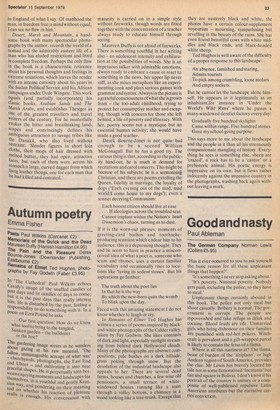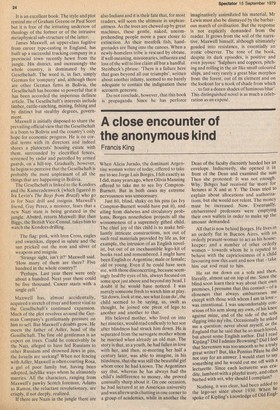Good and nasty
Paul Ableman
The German Company Norman Lewis (Collins £5.95) 'Has it ever occurred to you to ask yourself. the basic reason for all these unpleasant things that happen?' 'It's something I never stop asking about.'
'It's poverty. National poverty. Nobody gets paid, including the police, so they have to steal.'
Unpleasant things certainly abound in this book. The police not only steal but shoot casually. Bribery is normal. The gov ernment is corrupt. The people are inpoverished and take refuge in drink and cocaine. Blood feuds are rife. Unmarried girls who bring dishonour on their families are punished with red-hot pokers. Witchcraft is prevalent and a gift-wrapped parcel is likely to contain the fetus of a llama. Where is all this nastiness at? The llama, beast of burden of the 'altiplano', or high Andean region of South America, provides the clue. Mr Lewis has bravely located his tale not in some fictionalised 'Incatania' but fair and square in Bolivia. I don't know if his portrait of the country is unitary or a composite of well-publicised repulsive Latin American attributes but the narrative carries conviction. It is an excellent book. The style and plot remind me of Graham Greene or Paul Scott but it is free of the irritating undertow of theology of the fortner or of the intrusive metaphysical sub-structure of the latter.
James Maxwell, an upper-class fugitive from career type-casting in England, has built up a successful trucking company in a provincial town recently hewn from the jungle. His district, and increasingly the whole country, is dominated by the Gesellschaft. The word is, in fact, simply German for `company' and, although there are other German firms in Bolivia, the Gesellschaft has become so powerful that it has been accorded the imperious definite article. The Gesellschaft's interests include timber, cattle-ranching, mining, fishing and by distinct but stealthy degrees, government.
Maxwell is initially disposed to share the prevailing official view that the Gesellschaft is a boon to Bolivia and the country's only hope for economic progress. He is on cordial terms with its directors and indeed shares a plutocrats' housing estate with them, surrounded by electrified fences, screened by radar and patrolled by armed guards, on a hill-top. Gradually, however, he begins to perceive that the Gesellschaft ks probably the most unpleasant of all the things that are happening in Bolivia.
The Gesellschaft is linked to the Kondors and the Kameradenwerk (which figured in Ira Levin's The Boys from Brazil) who go in for Nazi drill and insignia. Maxwell's friend, Guy Perez, a minister, fears that a new Nazi state is being gestated in the jungle. Absurd, retorts Maxwell. But then Biggs, the British Vice-Consul, takes him to watch the Kondors drilling.
The flag: pink, with Iron Cross, eagles and swastikas, dipped in salute and the sun prickal out the iron and silver of weapons and insignia.
`Strange sight, isn't it?' Maxwell said. 'How many of them are there? Five hundred in the whole country?'
`Perhaps. Last year there were only about a hundred. Next year there could be five thousand. Cancer starts with a single cell.'
Maxwell has, almost accidentally, acquired a stretch of river and forest vital to the Gesellschaft's continued expansion. Much of the plot revolves around the German Company's gentlemanly pressure on him to sell. But Maxwell's doubts grow. He meets the father of Adler, head of the Gesellschaft. The fine old gentleman is an expert on trees. Could he conceivably be the Nazi, alleged to have fed Russians to other Russians and drowned Jews in piss, the Israelis are seeking? When not fencing with Adler, Maxwell is often courting Rosa, a girl of poor family but, having been adopted, ladylike ways whom he ultimately marries. All the characters, ranging from Maxwell's pawky Scotch foreman, Adams to Ramos, the reluctant revolutionary, are crisply, if not deeply, realized.
If there are Nazis in the jungle there are also Indians and it is their fate that, for most readers, will seem the ultimate in unpleasantness. As the trees are chewed up by great machines, these gentle, naked, uncomprehending people move a pace closer to extinction. As their menfolk fish, handgrenades are flung into the canoes. When a newly-homeless tribe is rescued by obtuse, if well-meaning, missionaries, influenza and loss of the will to live claim all but a handful. Steinbeck's phrase: 'There is a failure here that goes beyond all our triumphs', written about another infamy, seemed to me barely adequate to contain the indignation these accounts generate.
Do not conclude, however, that this book is propaganda. Since he has perforce imaginatively assimilated his material, Mr Lewis must also be dismayed by the barbarous march of civilisation. But the response is not explicitly demanded from the reader. It grows from the soil of the narrative. Maxwell himself, although ultimately goaded into resistance, is essentially an ironic observer. The tone of the book, despite its dark episodes, is positive and even joyous: 'Sulphurs and coppers, pitching and rolling in the air like small coloured ships, and very rarely a great blue morphos from the forest, out of its element and on the lookout for a nook of shade from which . . . to fan a dozen shades of luminous blue'. This distinguished novel is as much a celebration as an exposé.



































 Previous page
Previous page